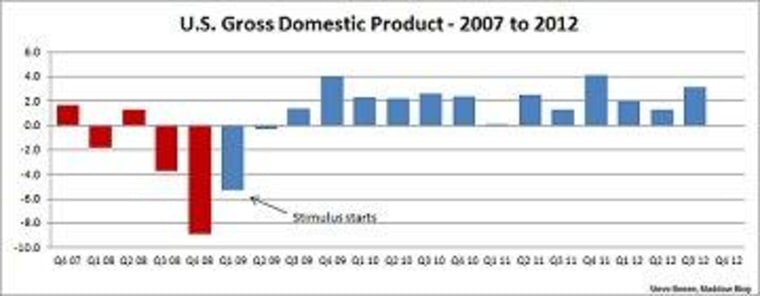One of top Politico stories of the day tells readers that, in the wake of yesterday's economic news, President Obama has a "GDP problem." After noting that the drop in economic growth was "largely due to a drop in government spending," the article adds:
Nonetheless, the politics are unambiguously terrible for Barack Obama ... and it gave an adrenal jolt to the a GOP messaging establishment left supine by the Mitt Romney mirage and recent soul-searchy infighting.
Politico's report added that Democrats "will try to spin" the news, but the party's "narrative" is "not very convincing" and burdened by "weakness."
It's almost as if facts, evidence, reason, and a cursory understanding of economic policy no longer matters at all. In reality, the economy shrank a little in the last quarter because of spending cuts, but the party demanding more spending cuts has suddenly received "an adrenal jolt" -- the Republican National Committee seemed inexplicably giddy after the GDP report was released -- even though it's now blisteringly obvious their agenda would undermine economic growth.
Any why are those who've been proven wrong acting like they've been proven right? Apparently it has something to do with whether D.C. media types are "convinced" by your "narratives."
For those who still take policy seriously, and still believe a sustained economic recovery is possible, the facts are readily available: the people who seemed happiest yesterday by discouraging economic news have it backwards, and are pursuing policies that would make the problem worse, not better.
That's not based on opinions and speculation; that's based on the report the misguided souls kept touting yesterday without reading.
It's really not that complicated.
[T]he government is hurting the recovery, and badly. But it's not because it's spending too much, or because of concerns over future policy. It's because government, at all levels, is spending and investing too little. Despite the stimulus and various other policies we've passed to help the recovery, and despite the large deficits the government has been running, government spending and investment have, at all levels, been contractionary since 2010.The new numbers the Bureau of Economic Analysis released on fourth-quarter economic growth have received considerable attention for the clear damage that falling government spending did to the economy. According to the BEA, "government consumption expenditures and gross investment" knocked 1.33 percentage points off the total change in economic growth. If government spending had just been neutral -- that is to say, if it had neither contracted nor expanded -- the economy would have grown by 1.23 percentage points rather than shrunk by 0.1 percentage points. [...]So yes, the government is hurting the recovery. But it's not because of deficits or uncertainty, or at least, it's hard to find evidence for either theory. The real, provable damage the government has done to economic growth in recent years has been in cutting back on spending and investment since 2010.
I can't speak to whether the Beltway is moved by the "narrative," but all available evidence makes clear that we're fighting for a recovery with one arm tied behind our back -- and we've been doing so for a couple of years now, with unsatisfying results. Ideally, we'd see the public sector and private sector adding jobs, injecting capital into the economy, and cultivating a strong recovery.
But we're not. Through much of 2010 and 2011, we saw state and local governments pursue austerity measures, slashing public investments and laying off public-sector workers -- most notably school teachers. But as 2012 drew to a close, we saw similar cuts in federal spending, and the result was yesterday's report showing an economy that's shrinking for the first time since 2009.
This is incredibly easy to fix -- policymakers can invest in the economy, lower unemployment, and inject capital into the system. But that's not going to happen, in part because gerrymandered district lines brought us a Republican majority in the House, and in part because the discourse is driven by folks who hardly bat an eye when policymakers who've been proven wrong act like they're received "an adrenal jolt" by bad news that further undermines their credibility.
